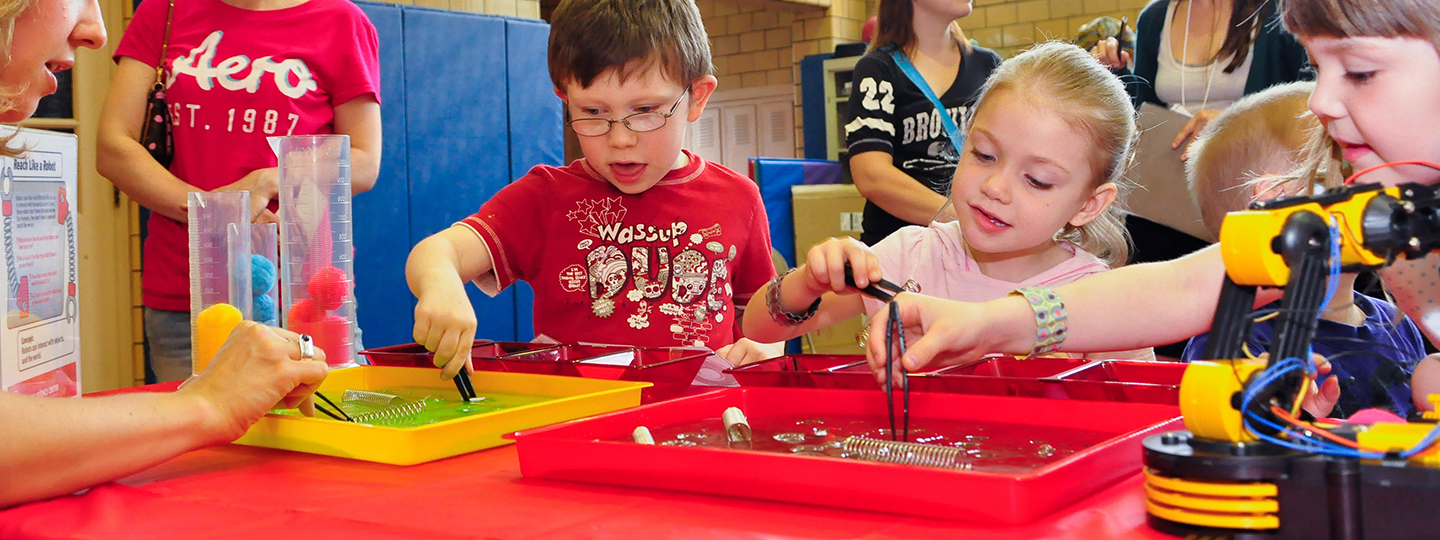
Early Childhood STEM Center
Early Learner Education: The Building Blocks of STEM
Children are born scientists, brimming with inherent natural curiosity.
The first eight years of a child’s life are critical for brain development. Especially in Pre-Kindergarten years, children who engage in STEM practices such as asking questions and forming explanations build a strong foundation for skills learned in K–12 education and beyond. Without this opportunity for exploration, students may grow to lack confidence in their own abilities as early as Kindergarten.
Carnegie Science Center believes every young child should have equal access to high-quality science, technology, engineering, and math (STEM) engagement in an environment built to nurture their natural curiosity.
To meet this goal, Carnegie Science Center has been working since 2009 to develop and deliver a rigorously prototyped and independently evaluated model of early childhood STEM engagement. Recognizing that early learners need rich environments, prepared teachers, and engaged families to develop STEM skills, Carnegie Science Center launched its Early Childhood STEM Center in 2016 to serve as a regional and national model of excellence in early STEM education. The Center is a part of the Science Center’s Center for STEM Education and Career Development.
To carry out its vision, the Early Childhood STEM Center partners with thought leaders, education centers, and funders in the field of early childhood.
Mission & Goals
The mission of the Early Childhood STEM Center is to provide a foundation of STEM learning experiences for early learners, their educators, and their families, creating a continuum to the established STEM Center programming. The Early Childhood STEM Center informs all Carnegie Science Center programs reaching young learners, while also serving as a regional and national program model.
Initiatives of Carnegie Science Center's Early Childhood STEM Center
On-site exhibits and programs
At Carnegie Science Center’s dedicated early learner gallery, young scientists explore and express their natural curiosity in a space developed just for them. Early learners can discover more through summer camps, classes, programs, and planetarium shows tailored for their age group. During the school year, six-week semesters encourage skills of inquiry and independence and help students develop Kindergarten readiness.
Outreach Programs
Through the Science Center’s outreach program called "Science on the Road," hands-on programming reaches early childhood students, families, and teachers in a five-state region.
Collaboration
Carnegie Science Center has collaborated with more than 150 Head Start classrooms to deliver and evaluate its early STEM engagement model, reaching more than 300 education professionals and thousands of low- to moderate-income early childhood students and their families.
Access and Equity
Powered by PNC Grow Up Great and in collaboration with One Northside, Carnegie Science Center is creating a continuum of access to early learners and their families in the Science Center’s North Side neighborhood through community programming and outreach.
Literacy
As part of the PNC-funded Buzzword Pittsburgh ![]() , Carnegie Science Center delivers STEM-focused vocabulary acquisition programming to the Homewood community, including the Pittsburgh Association for the Education of Young Children (PAEYC) Early Childhood Hub. Carnegie Science Center encourages early literacy through STEM by the use of rich vocabulary, open-ended questioning, and the process of inquiry.
, Carnegie Science Center delivers STEM-focused vocabulary acquisition programming to the Homewood community, including the Pittsburgh Association for the Education of Young Children (PAEYC) Early Childhood Hub. Carnegie Science Center encourages early literacy through STEM by the use of rich vocabulary, open-ended questioning, and the process of inquiry.
Impact Beyond Pennsylvania
In partnership with the West Virginia Department of Education and the Benedum Foundation, Carnegie Science Center’s lendable family science backpacks are in use in 1,200 Universal Pre-K classrooms throughout West Virginia.
Program Goal
Provide a foundation of science, technology, engineering, and math (STEM) learning experiences for early learners, their families, and their educators, creating a continuum to the Center for STEM Education and Career Development.
What We Do
For teachers:
- Offer professional development for educators through the Teaching Excellence Academy.
For families:
- Create new STEM initiatives for early learners.
- Share and promote strategies for families to engage early learners in STEM.
For museums:
- Advise leaders of Carnegie Science Center programs and departments on incorporating best STEM practices for early learners.
- Provide professional development in best early childhood STEM practices to staff.
- Lead and participate in professional conferences, webinars, and other learning activities for early childhood stakeholders.

STEM Center Founding Partners include Bayer, Chevron, Duquesne Light Company, Eaton, FedEx, Kennametal Foundation, NOVA Chemicals, and PPG Foundation.

